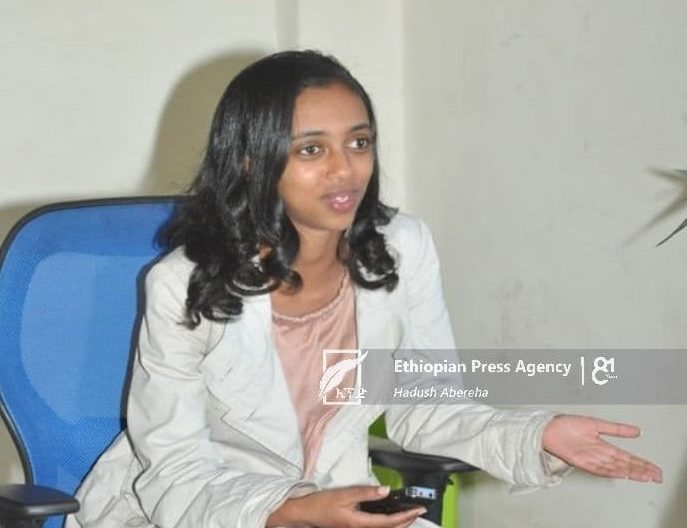
Peniel Hailu, a space science enthusiast, is a young electrical and computer engineer. She recently graduated from Addis Ababa Institute of Technology in the field of Electrical and Computer Engineering. She is also volunteering in Africa America trade council.
Though, it is assumed that studying electrical engineering is usually forced upon women by the government, she did love the concept of physics since she was in high school and did choose to study electrical engineering and majored in electronics.
As she always wanted to help her people and work for the common good of the society, she has been engaging in so many volunteering activities since she was very young. This, in turn, has helped her to develop the skill of managing projects, building things and coordinating programs.
The Ethiopian Herald had a short stay with the space science enthusiast to talk about her passion in space science and her participation in volunteerism. Enjoy!
As you said you were interested in the space science and it was your first choice to learn electrical engineering. So, what was your inspiration?
Since I was a child, my father used to bring me things that are related with space science, new inventions and the like things. We used to watch BBC covering about space science programs. I was fascinated about space science and I still am.
I was also introduced with physics in grade seven and I loved the exercise that my mind goes through to figure out the mathematics. I knew that I was going to learn something that I enjoyed and; that was physics. That is why I joined electrical engineering.
However, lots of people think that the only way for many women to join electrical engineering is if the government only assigned them to learn. And, people think that it was not my choice; but it really was.
I actually loved physics from the very beginning. I specialized in electronics which is about building and designing boards. Unfortunately, we don’t have that kind of company here. I was an intern in Ethiopian Space Science. I could not go further because they can only hire someone with a master’s degree.
Did you find it difficult to study electrical engineering?
I did find it difficult. It was a really long and difficult journey. There are times in the middle that I said I don’t think I could make it, I better change. For me, my parents were very supportive. Not many people are privileged with this kind of supportive parents.
They kept motivating and encouraging me but there was times that I said I should change the field. It was not because I was a woman; but particularly our batch had encountered a problem when we were first year students. The system there is difficult for the students.
I kept going on because I had my families support and God has helped me going through it. Nonetheless, the journey becomes difficult because the problem lies with the system not with the course.
Since the teachers are so manipulative, they make it seem like the course is difficult. I am not saying that the field is easy, but for someone who is interested, he/she can achieve good results. But, the teachers should also focus on educating not manipulating and showing their authority to the students.
In a developing country like Ethiopia, what do you think is the importance of working in space science?
Well, as you can see, we always thought that it was impossible for the third world countries let alone Ethiopia to be one of the countries who have satellites up there; but we did it; which tells us that nothing is actually impossible. It is the things that we have actually set in our mind that constraint us from achieving things. It is only the mindset that truly changes the world.
If the imagination that we have for our country is poor, we achieve nothing. We have a satellite in the space which shows us that we can excel and go further at this thing. Space science is very vast and interesting. I bet there is no man existed that would not be fascinated by even seeing the moon and the stars; and space science is beyond that.
Imagine what it could do for the nation economy. The first satellite that was launched gathers, takes commands, pictures and sends back it to the conservative that is located in Entoto.
In the past five years, we are able to receive pictures from the space and gather data. It is like having an eye sky. Imagine what we could do if we advance our satellite and if we could do many things. So advancing in space science is mandatory and I don’t think that is not achievable. We have already done it and it is pushing to the front that is left to do.
What do you expect in the future regarding advancing technology and space science?
There are Ethiopians who have dedicated their time, capital and sacrificed their lives for the greater good of the technology. As far as there are people who follow the suit, I do not think that the country’s future is at risk.
As for myself, I have a plan to go further in space science and I am getting in touch with concerned bodies to find ways and engage in activities related to space science.
What lessons did you learn from your journey and from the challenges you passed in the campus?
The first thing that I learned is controlling my emotions. There are a lot of challenges that we faced in campus starting from due days of projects, assignments and exams. There were two things that I could do- either to panic and give up or I could just sit down and disciplined myself. And I chose the latter.
The main thing that I could say that I have learnt is controlling my emotions and learning to discipline myself in order to achieve the things that people actually think are unachievable and it also helped me to be persistent.
How did you get the chance to volunteer in Africa America Trade Council?
I went somewhere to hold a discussion with someone and got to talk with Tibebu, who is one of the members of the International Rotary Club. We got to chat while waiting for the person we both went to meet. He was fascinated by the things I shared with him. I think he saw something in me.
Currently, I am actively volunteering in Rotary International, which incorporates other clubs and projects. We hold blood donation every three months, and we have so many projects such as detecting eye vision and sanitary projects.
So now, I am incorporated and included in this huge deal that is supposedly help Ethiopia, Africa and the world. I am going to be responsible for the activities and projects that are going to be held in Ethiopia.
These projects would change the lives of the women, engaged in baking injera for market, and the women who collect woods, I am now the Project Manager and Executive Assistant.
Are you able to say that your experience in the campus helped you in the activities you perform in the voluntary services you engaged in?
Being persistent and achieving the goal during my stay in the campus helped me in volunteerism. When you are a volunteer, nobody is going to pay you; you just do everything on your own. Especially when you are in leadership and director position, things are a bit hectic since everyone expects you to do everything. So, I think delegating tasks in time and achieving the goal is an experience I developed it from my experience in campus.
When I come to the volunteerism, my parents have always inspired me to do the greater good. My father has always been the person who helps people and he has always inspired me. He used to advise me to join volunteer groups, build my confidence, improve my public speaking skills, and be open to learn. I would say that, he played a huge role; but as I grew up, I also had my own ways and paths.
I believe that, if you only exist just for you that would be being selfish. Human beings are not designed that way. Volunteerism is a habit; it is not something you just do it in groups. The organization might help us reach people, but volunteering and sharing is a habit, a practice you live on.
What do you advice young generation to participate in volunteerism activities especially at this time where the nation needs support from the youth?
I would like to make for the youth clear that volunteerism doesn’t consume their time. The concept of volunteerism is starting to be in the heart of people though, it might not be appreciated.
Hence, I advise them to not engage in volunteerism just to get recognition paper. Rather, they should start with the state of mind and discipline. I believe that they will come to understand the importance of helping when they start to lend their hands to others.
mind and discipline. I believe that they will come to understand the importance of helping when they start to lend their hands to others.
BY BETELHEM BEDLU
THE ETHIOPIAN HERALD TUESDAY 8 MARCH 2022





